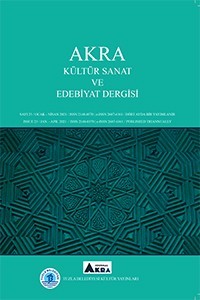Güçlendirici Otobiyografi: S. Morgan’in My Place’indaki Aborijin Kadin Yazarlarin Sesi
otobiyografi, Aborijin kadınları, kolonyal söylem, karşıt söylem, kimlik, kendini keşfetme
The Empowering Autobiography: The Voice Of The Aboriginal Women Writers In S. Morgan's My Place
autobiography, Aboriginal women, colonial discourse, counter discourse, identity, self-discovery,
___
- Brewster, Anne. (2015). Reading Aboriginal Women’s Life Stories. Sydney University Press.
- Fanon, Franz. (1967). The Wretched of the Earth. Trans. by Constance Farrington. London:Penguin.
- Ghosh, Subhankan. (2018). "Quest for Place through the Reconstruction of History, Cul-tural and Ethnic Belonging in Sally Morgan’s My Place: A Postcolonial Study." International Journal of Research vol. 05. https://pdfs.semanticscholar.org/8c76/e3105517e617ec1b57793fb7a4d514aa231a.pdf https://acadpubl.eu/hub/2018-119-15/4/609.pdf
- Gilfedder, Deirdre. (2001). "Testimonial and Stories from the 'Stolen Generation' in Aus-tralia." Eye to Eye: Women Practising Development Across Culture. Susan Perry and Celeste Marguerite Schenck, eds. Zed Books.
- Kelly, Debra. (2005). Autobiography and Independence: Selfhood and Creativity in North African Postcolonial Writing in French. Liverpool University Press.
- Kumar, Rajesh. (2015). Australian Aboriginal Autobiographies: Reading Identity, Aborig-inality and Belongingness. Sangharsh Publication. https://www.academia.edu/34914574/Australian_Aboriginal_Autobiographies_Reading_Identity_Aboriginality_and_Belongingness
- Linda. (2012). An Anthropological and Literary Study of Two Australian Aboriginal Wom-en’s Life Histories: The Impact of Enforced Child Removal and Policies of Assimilation. The Edwin Mellen Press.
- Morgan, Sally. (1987). My Place. Fremantle Arts Centre Press.
- Morton, Stephen. (2010). "Marginality: Representation of Subalternity, Aboriginality and Race." A Concise Companion to Postcolonial Literature, Shirley Chew and David Richards, eds. Blackwell Publishing.
- Muchiri, Jennifer Nyambura. (2018). "The Female Autobiographical Voice in Independent Kenya." Unpublished PhD Thesis. University of Nairobi, 2008.
- Nandana, G S, and Varsha K. "Representation of Women in Sally Morgan’s My Place." International Journal of Pure and Applied Mathematics, Vol. 119, pp. 1979-1987.
- Valente, Marcela Iochem. (2008). "Autobiography: a Voice to the Subaltern." A Cor das Letras UEFS, n. 9.
- Westphalen Ashcroft , Bill et. al, eds. (1995). The Postcolonial Studies Reader. Routledge.
- ISSN: 2148-0370
- Yayın Aralığı: Yılda 3 Sayı
- Başlangıç: 2013
- Yayıncı: Tuzla Belediyesi
Ali Fuad Başgil İle İlgili Yapılan Çalışmalar Üzerine Bir Bibliyografya Denemesi
İstiklal Marşı’nın Kabulü ve Mehmet Akif Ersoy Temalı Posta Pulları Üzerine Bir Değerlendirme
Anadolu’da Kalem İşi Süslemeye Bir Örnek: Amasya Taşova Aşağı Baraklı (Özbaraklı) Camii Mihrabı
Daniel Sibony’nın Marrakech Le Depart Evde Mekânsal Ayrım ve Sürgün
Atasözlerindeki Ses Uyumları Üzerine
Divan Edebiyatı Eleştirilerinin Tanzimat Edebiyatında Edebî Akımların Gelişimine Etkisi
Güçlendirici Otobiyografi: S. Morgan’in My Place’indaki Aborijin Kadin Yazarlarin Sesi
Türk Kültürünün İrfan Mirası-Ahilik Birliğinin İslam Medeniyet Tarihine Katkıları Üzerine
